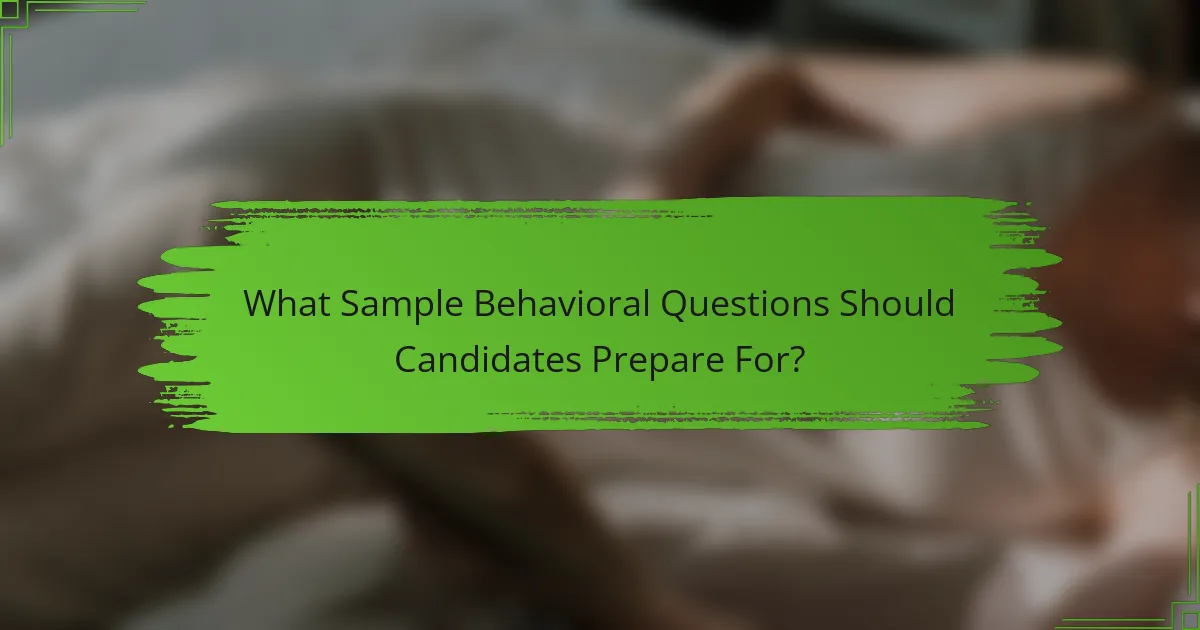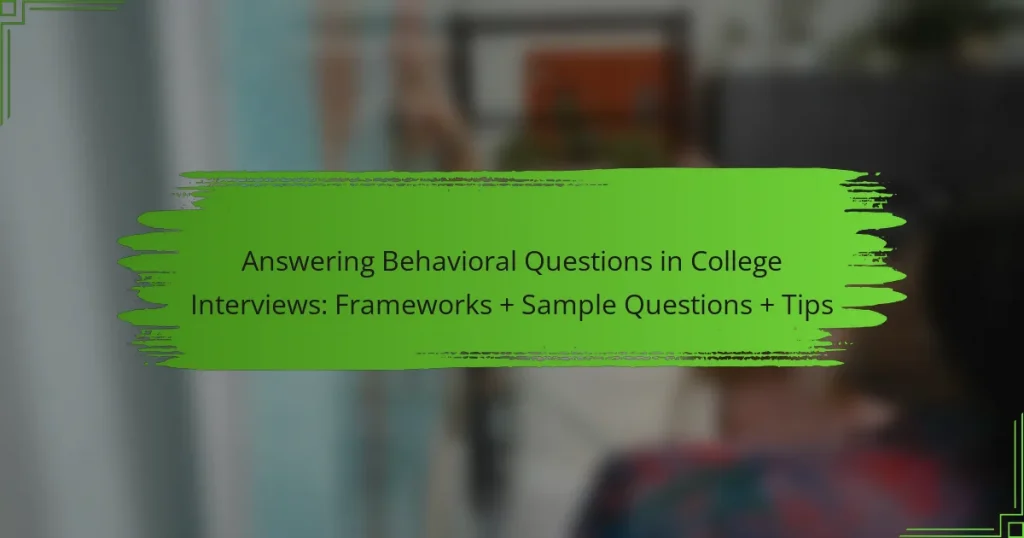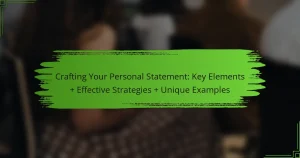
What are Behavioral Questions in College Interviews?
Behavioral questions in college interviews assess a candidate’s past experiences to predict future behavior. These questions often start with phrases like “Tell me about a time when…” or “Give me an example of…”. They focus on specific situations, challenges, and responses. The goal is to evaluate skills such as problem-solving, teamwork, and leadership. Colleges use these questions to gauge how candidates handle real-life scenarios. Research shows that behavioral interviews can be more predictive of future performance than traditional interviews. This method is widely adopted by many institutions in their selection processes.
Why are Behavioral Questions Important for College Interviews?
Behavioral questions are important for college interviews because they assess a candidate’s past experiences and behaviors. These questions help interviewers predict future performance based on how candidates have handled situations in the past. For instance, research shows that behavioral interviews can lead to better hiring decisions, as they focus on real-life examples rather than hypothetical scenarios. This approach allows interviewers to evaluate skills such as problem-solving, teamwork, and adaptability. By analyzing specific instances, colleges gain insights into a candidate’s character and suitability for their programs.
How do Behavioral Questions differ from Traditional Interview Questions?
Behavioral questions focus on past experiences to predict future behavior, while traditional questions often ask about hypothetical scenarios or general qualifications. Behavioral questions require candidates to provide specific examples of how they handled situations in the past. This approach allows interviewers to assess skills like problem-solving and teamwork through real-life context. In contrast, traditional questions may ask about strengths, weaknesses, or career goals without requiring specific examples. Research shows that behavioral questions are more effective in predicting job performance, as they are grounded in actual behavior rather than theoretical responses.
What insights do Behavioral Questions provide to interviewers?
Behavioral questions provide interviewers with insights into a candidate’s past behavior and decision-making processes. These questions reveal how candidates have handled specific situations in the past. Interviewers use this information to predict future performance and cultural fit. Behavioral questions often focus on competencies such as teamwork, problem-solving, and leadership. For example, a question about a challenging project can show resilience and adaptability. Research indicates that past behavior is a strong predictor of future actions. This makes behavioral questions a valuable tool in the selection process.
What Frameworks Can Help in Answering Behavioral Questions?
The STAR framework is effective for answering behavioral questions. STAR stands for Situation, Task, Action, and Result. This method encourages candidates to provide structured responses. Candidates describe a specific situation they faced. They outline the task they needed to accomplish. They explain the actions they took to address the situation. Finally, they share the results of their actions. Research indicates that structured responses improve clarity and impact during interviews. Another useful framework is the CAR method, which stands for Challenge, Action, and Result. This method focuses on the challenge faced, the action taken, and the outcome achieved. Both frameworks help interviewees articulate their experiences clearly and concisely.
What is the STAR Method and how is it applied?
The STAR Method is a structured approach for answering behavioral interview questions. It stands for Situation, Task, Action, and Result. This method helps candidates articulate their experiences clearly and effectively.
In the Situation step, candidates describe the context of their experience. The Task step outlines the specific challenge or responsibility they faced. In the Action step, candidates explain the actions they took to address the task. Finally, the Result step highlights the outcomes of those actions, ideally with quantifiable results.
Using the STAR Method allows candidates to provide comprehensive answers that demonstrate their skills and problem-solving abilities. This framework is widely recognized for its effectiveness in interviews, particularly in academic and professional settings.
How can the CAR Method enhance responses to Behavioral Questions?
The CAR Method enhances responses to Behavioral Questions by providing a structured framework. It stands for Context, Action, and Result. This method helps candidates articulate their experiences clearly. By setting the context, candidates provide background information. The action segment outlines the specific steps taken. Finally, the result illustrates the outcome of those actions. Research shows that structured responses lead to more favorable evaluations in interviews. A study by the National Association of Colleges and Employers found that clarity in responses significantly improves interview performance.

What Sample Behavioral Questions Should Candidates Prepare For?
Candidates should prepare for behavioral questions that assess their past experiences and decision-making skills. Common sample questions include “Describe a time when you faced a challenge and how you overcame it.” This question evaluates problem-solving abilities. Another example is “Give an example of a goal you set and how you achieved it.” This assesses goal-setting and perseverance. Candidates may also encounter “Tell me about a time you worked in a team.” This evaluates collaboration and communication skills. Preparing for these questions helps candidates demonstrate their competencies effectively.
What are Common Behavioral Questions Asked in College Interviews?
Common behavioral questions asked in college interviews include inquiries about teamwork, leadership, and conflict resolution. Interviewers often ask candidates to describe a situation where they overcame a challenge. They may also request examples of working effectively in a group. Another frequent question is about a time when the candidate demonstrated leadership skills. Interviewers might inquire how candidates handle failure or setbacks. Questions about managing time and prioritizing tasks are also common. Candidates may be asked to discuss their motivations and how they set goals. These questions help assess a candidate’s problem-solving abilities and interpersonal skills.
How can candidates effectively answer questions about teamwork?
Candidates can effectively answer questions about teamwork by using the STAR method. The STAR method stands for Situation, Task, Action, and Result. First, candidates should describe the situation they faced in a team setting. Then, they should explain the specific task they were responsible for within the team. Next, candidates must detail the actions they took to address the task. Finally, they should share the results of their actions, highlighting any positive outcomes. This structured approach provides clarity and demonstrates the candidate’s role in the teamwork dynamic. Research shows that structured answers help interviewers better assess a candidate’s skills and experiences.
What strategies can be used to respond to conflict resolution questions?
Effective strategies to respond to conflict resolution questions include using the STAR method. The STAR method stands for Situation, Task, Action, and Result. First, describe the situation that presented the conflict. Next, explain the task you needed to address. Then, detail the actions you took to resolve the conflict. Finally, share the results of your actions and what you learned. This structured approach provides clarity and demonstrates your problem-solving skills. Research shows that interviewers appreciate candidates who can articulate their experiences clearly and effectively.
How can Candidates Tailor Their Responses to Specific Questions?
Candidates can tailor their responses to specific questions by aligning their answers with the job description and company values. They should first analyze the question to understand its intent. Next, candidates can use the STAR method: Situation, Task, Action, Result. This method helps structure responses effectively. Candidates should include relevant experiences that showcase their skills. They must also emphasize qualities that the employer values. Researching the company can provide insight into what attributes to highlight. This approach ensures responses are both relevant and impactful.
What techniques can be used to highlight personal achievements?
Techniques to highlight personal achievements include using the STAR method, quantifying results, and storytelling. The STAR method involves describing the Situation, Task, Action, and Result of an achievement. This structured approach provides clarity and context. Quantifying results with specific metrics strengthens the impact of achievements. For example, stating “increased sales by 30%” adds credibility. Storytelling engages the listener and makes achievements relatable. Sharing personal anecdotes can illustrate the significance of accomplishments. These techniques effectively convey achievements during interviews, making them memorable.
How should candidates prepare examples that demonstrate problem-solving skills?
Candidates should prepare specific examples that showcase their problem-solving skills. They should identify past challenges they faced in academic or extracurricular settings. Each example should follow the STAR method: Situation, Task, Action, Result. Candidates must clearly describe the context of the problem. They should outline their specific responsibilities and the actions they took to address the issue. It is essential to emphasize the positive outcomes of their actions. Quantifying results, such as improved grades or project success, adds credibility. Practicing these examples helps candidates articulate their problem-solving process confidently during interviews.

What Tips Can Enhance Performance in College Interviews?
Practice common interview questions to build confidence. Research the college and its values to align your answers. Dress appropriately to create a positive first impression. Use the STAR method to structure responses to behavioral questions. Maintain eye contact to convey engagement and confidence. Listen carefully to questions and ask for clarification if needed. Follow up with a thank-you note to express appreciation. These strategies are supported by studies showing that preparation and professionalism significantly improve interview outcomes.
How can candidates practice for Behavioral Questions effectively?
Candidates can practice for behavioral questions effectively by using the STAR method. The STAR method stands for Situation, Task, Action, and Result. Candidates should identify relevant experiences that showcase their skills. They can outline these experiences using the STAR framework to structure their responses clearly. Practicing with a friend or mentor can provide valuable feedback. Recording responses and reviewing them helps identify areas for improvement. Additionally, candidates should research common behavioral questions to prepare specific examples. This approach enhances confidence and clarity during interviews.
What role does mock interviewing play in preparation?
Mock interviewing plays a crucial role in preparation for college interviews. It helps candidates practice their responses to behavioral questions. This practice enhances their confidence and reduces anxiety during actual interviews. Mock interviews provide immediate feedback on performance. Participants can refine their answers based on this feedback. Research shows that practicing interview skills improves overall interview performance. A study by the National Association of Colleges and Employers found that mock interviews significantly increase job readiness. Therefore, engaging in mock interviews is essential for effective interview preparation.
How can feedback from peers improve response quality?
Feedback from peers can significantly improve response quality. It provides diverse perspectives that enhance understanding. Peers can identify gaps in reasoning or clarity. They may suggest alternative approaches that strengthen answers. Constructive criticism helps refine communication skills. Collaborative feedback fosters a supportive learning environment. Research shows that peer feedback can lead to better performance outcomes. A study by Topping (1998) indicates that peer assessment improves learning and retention.
What Best Practices Should Candidates Follow During Interviews?
Candidates should prepare thoroughly for interviews. Research the company and its culture. Understand the job description and requirements. Practice common interview questions, especially behavioral ones. Use the STAR method to structure responses. Dress appropriately for the interview setting. Arrive on time to demonstrate punctuality. Maintain eye contact and offer a firm handshake. Follow up with a thank-you email after the interview. These practices enhance the candidate’s chances of making a positive impression.
How important is body language in answering Behavioral Questions?
Body language is crucial in answering behavioral questions. It significantly influences the interviewer’s perception of a candidate. Non-verbal cues like eye contact, posture, and [censured] expressions convey confidence and engagement. Research shows that 55% of communication is non-verbal. Effective body language can enhance the clarity of verbal responses. It helps establish rapport and trust with the interviewer. A positive demeanor can make responses more persuasive. Conversely, negative body language may undermine a candidate’s answers. Thus, mastering body language is essential for successful interview outcomes.
What should candidates do if they struggle to recall an example?
Candidates should pause and take a moment to gather their thoughts. They can think about similar situations that may not be exact examples but are relevant. It is helpful to consider different aspects of their experiences, such as teamwork or problem-solving. If necessary, candidates can ask the interviewer for clarification or to rephrase the question. This approach shows engagement and allows candidates to think critically. Additionally, candidates can use the STAR method (Situation, Task, Action, Result) to structure their response. This method provides a clear framework for recalling relevant experiences. Being honest about the struggle is also acceptable. Transparency can create a positive impression.
Behavioral questions in college interviews are designed to evaluate candidates’ past experiences to predict their future behavior, focusing on skills such as problem-solving, teamwork, and leadership. This article outlines the significance of these questions compared to traditional interview formats, introduces frameworks like the STAR and CAR methods for structuring responses, and provides sample questions candidates may encounter. Additionally, it offers practical tips for interview preparation, including strategies for effective communication and the importance of body language. Overall, the article serves as a comprehensive guide for candidates to enhance their performance in college interviews.




